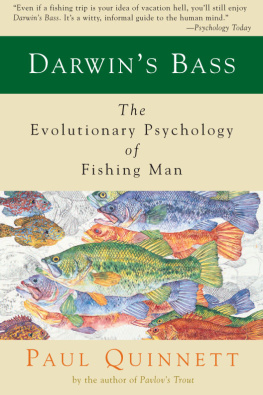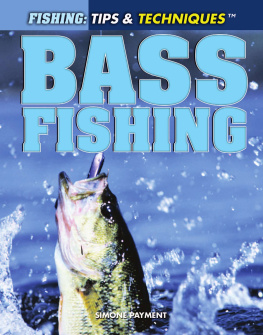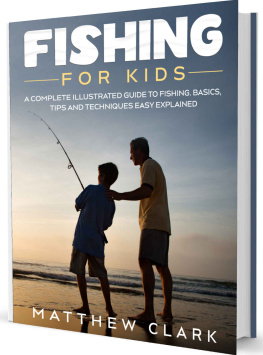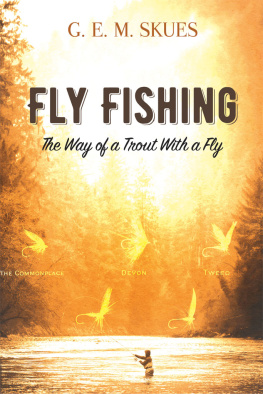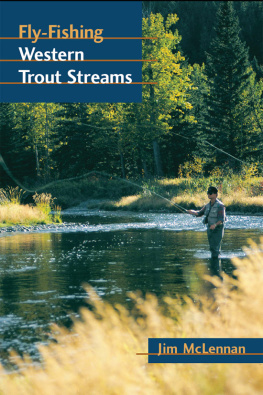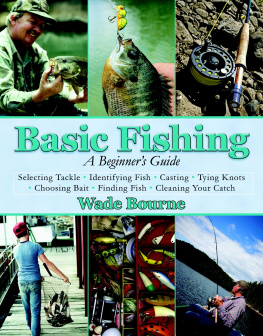

Also by Paul Quinnett
Pavlovs Trout
Darwins Bass
Suicide: The Forever Decision

Fishing Lessons copyright 1998 by Paul Quinnett. All rights reserved. No part of this book may be used or reproduced in any manner whatsoever without written permission except in the case of reprints in the context of reviews.
Andrews McMeel Publishing, LLC
an Andrews McMeel Universal company
1130 Walnut Street, Kansas City, Missouri 64106
Cover illustration copyright 1998 by Eileen Klatt.
www.andrewsmcmeel.com
Library of Congress Cataloging-in-Publication Data
Quinnett, Paul G., 1939
Fishing lessons : insights, fun, and philosophy from a passionate angler / Paul Quinnett.
p. cm.
1. FishingAnecdotes. 2. FishingPsychological aspects.
3. FishingPhilosophy. 4. Fishing stories. I. Title.
S H441.Q57 1998
799.1dc21 98-3986
CIP
ATTENTION: SCHOOLS AND BUSINESSES
Andrews McMeel books are available at quantity discounts with bulk purchase for educational, business, or sales promotional use. For information, please e-mail the Andrews McMeel Publishing Special Sales Department:
For Pam (a.k.a. Ann)

Contents

Foreword
P aul Quinnett and I had just sat down at a table in a Japanese restaurant when a lady, the owner it turned out, rushed up and began sternly berating us in Japanese. I was shocked and embarrassed, unable to think what odious offense we must have committed, although in such circumstances Quinnett is always suspect. Paul instantly fired back at the lady, his retort delivered just as sternly. This startled me even more, but to my relief the owner laughed and clapped her hands. Clearly, this was some sort of long-standing joke between them. But I was still no less astonished. Not only had Paul responded to the lady in kind, he had done so in fluent Japanese! Its not every day you lunch with a fifty-five-year-old, six-foot-four American friend who happens to be a clinical psychologist, book author, essayist, magazine-article writer, columnist, humorist, teacher, lecturer, public speaker, entrepreneur, raconteur, andthis above alldedicated fisherman, who suddenly starts spouting Japanese. I couldnt have been more surprised if he had started speaking in tongues. I suppose thats next! Lord only knows for what reason he learned Japanese, except possibly to order food in Japanese restaurants. That may seem excessive, but then again Paul Quinnett is nothing if not excessive.
One thing you will learn about Fishing Lessons when you read it is that it doesnt contain a single fishing lesson. Well, maybe one. That is: Fish more! No matter how much you think you fish, I can tell you right now that Paul Quinnett would scoff at your pitiful effort. You say you fish every Saturday all year long? Stop! Say no more. Youd make Quinnett laugh out loud. Paul himself, busy as he is with all his activities, only manages to get in what he regards as the minimum amount of time one should devote to fishing, if one wishes to preserve, or recover, ones mental health and proper perspective on life in general. He makes certain he fishes at least eighty days a year! And not just in the fifty lakes scattered around his rural home but all over the country and in foreign lands and distant seas as well.
Allow me to clarify a bit. Fishing Lessons is about lessons. The lessons, though, arent about fishing, although they tend to arise out of fishing. The lessons are about moderation and excess, success and failure, proportion, life and death, hope, humor, ethics, love and war, and so on, but they also are about Paul Quinnett fishing, endlessly fishing.
I have been studying Paul for a long time, because he is a person well worth studying. He is the busiest human being I know, have ever known. He goes through life as a kind of blur to most of us observers, but suddenly the blur stops, and there he is, up to his hips in water, casting a bit of fluff out toward some dimpling blue water, and we are rushing past headed for our next rendezvous with the future. How does he do it? That is the question I constantly ask myself. As one of the leading experts in the world on suicide, he spends a good part of his life in the company of people bound up in terminal despair and desperation. Does he ever recommend fishing to these patients as a therapy? Only a fool wouldnt, he says. And I have to believe him. Quinnett is the sanest person I know. What is it that makes him so? If not the fishing, what?
Fishing Lessons provides a lot of the answers about Paul Quinnett. One of my favorite essays in this collection is the one in which Paul as a boy triumphs over chicken manure, or the shoveling there of. Most people, in my opinion, could not learn a whole lot from chicken manure, but Paul extracts a life lesson from it, as he does from almost everything. Forget all those other books about the secrets of highly successful people. You want to know about what really leads to success, you read Paul Quinnett on chicken manure.
Even as he jets hither and yon about the world delivering speeches and accepting awards, theres almost always a rod case in the overhead compartment. Thats Pauls way of keeping one foot on the ground and, as you will learn from his essays, back in the nineteenth century. Adept as he is in navigating through the Age of Information, he is not fond of it.
Frugal is how Quinnett describes himself, and there are lessons in this book about frugality, thats for sure. Paul throws nothing away, not even fish carcasses. His story about his attempt to create fish fertilizer in a barrel in his backyard from filleted-out fish carcasses is one of my all-time Quinnett favorites, and I know it to be true. There in the backyard of this distinguished psychologist is a odorous time-bomb brewing and bubbling and sending out fumes so potent that distant neighbors are out on their decks scanning the neighborhood with binoculars in search of the culprit. Paul, of course, is the number-one suspect. Then comes the day of his wife Anns garden party in the Quinnetts backyard and... Well, its simply too horrible for me to go into here. Youll just have to read the essay.
The thing I hate about reading Pauls essays is that I always end up with a powerful urge to improve myself. So I lie down with a wet cloth on my forehead, and after a while the urge goes away. But never entirely. His essays always leave me viewing life a little bit differently. On such occasions, theres only one thing to do: grab a rod and a book of flies and head out to the nearest lake.
Years ago I predicted in print that Pauls book Pavlovs Trout would become a fishing classic, even though it wasnt really about fishing either. I believe that prediction of mine has proved out. So Im certainly not going to make the same prediction about Fishing Lessons. Its bad enough when you have to put up with a friend who has written one classic. Two would be just too much to bear.
Patrick F. McManus

Next page

